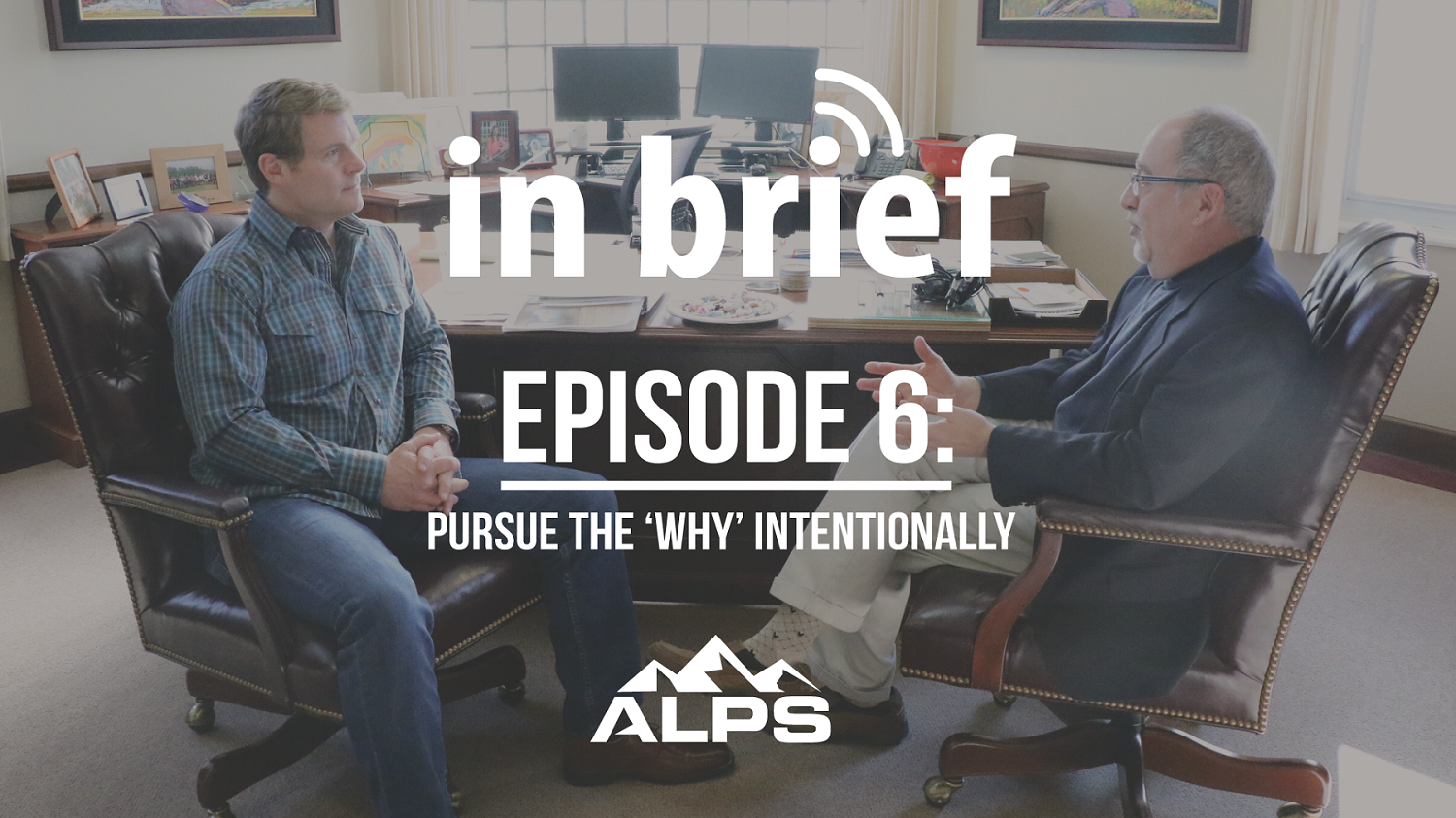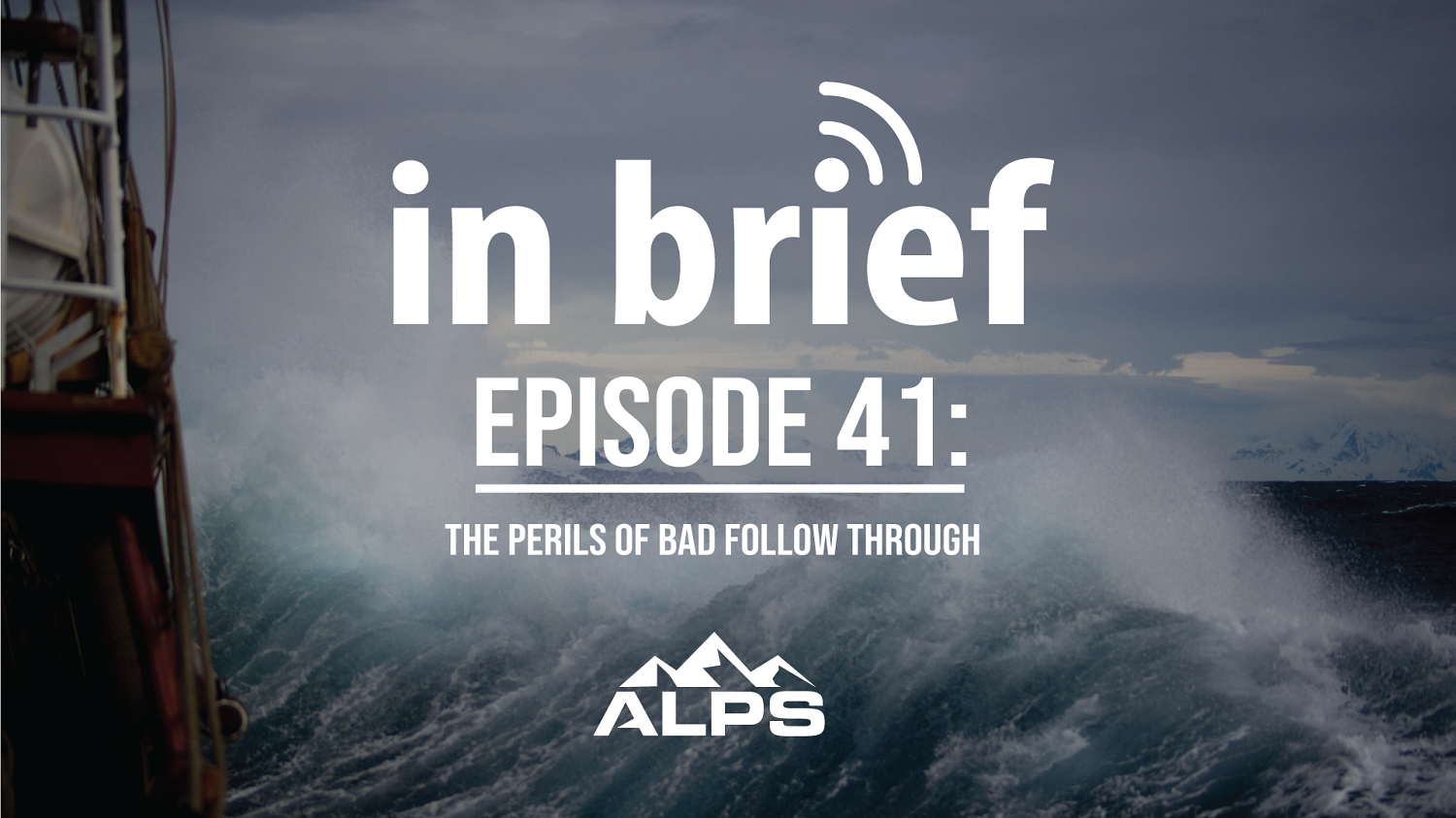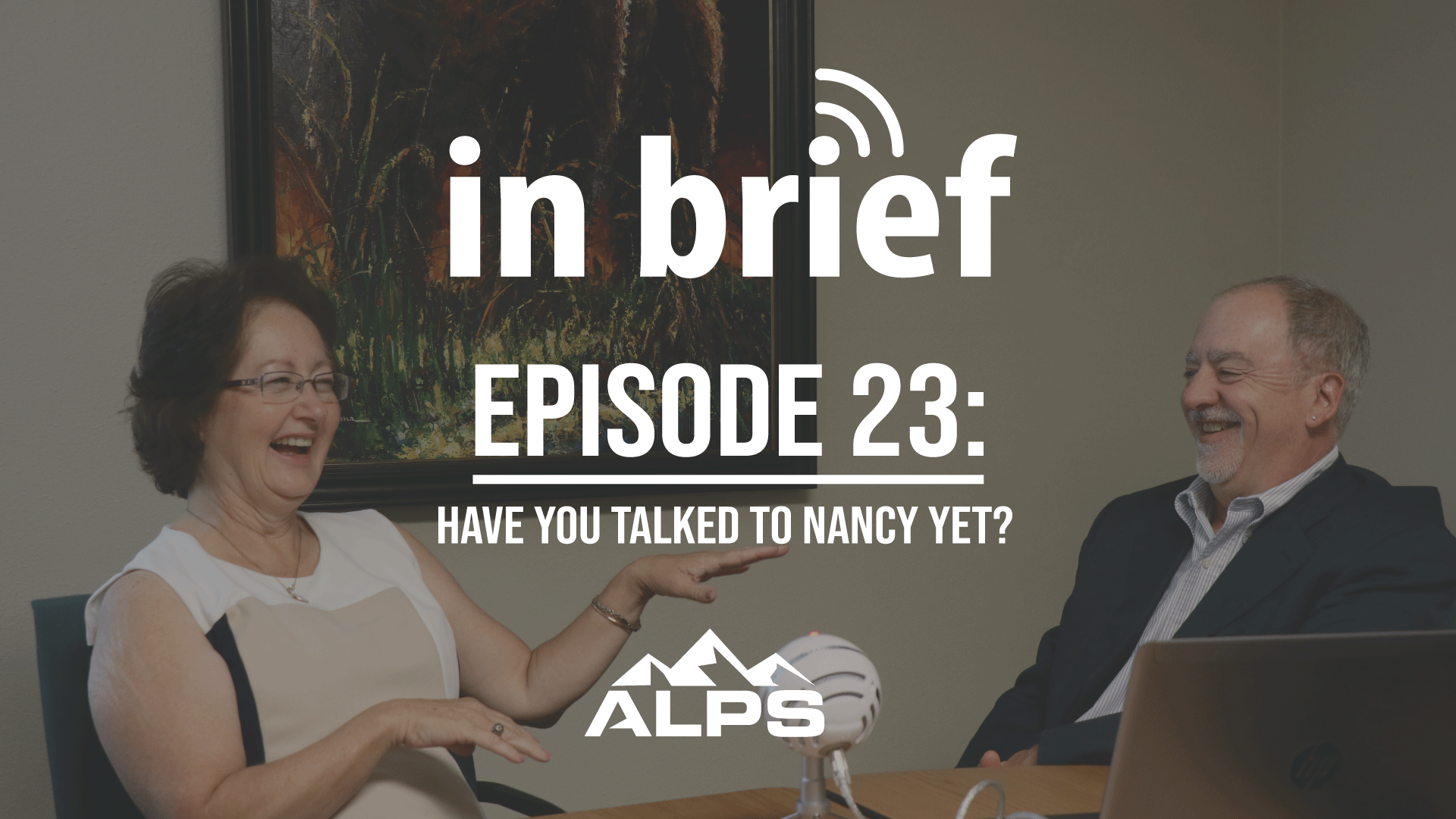ALPS In Brief Podcast - Episode 6: Pursue the ‘Why’ Intentionally.
8 min read
 Mark Bassingthwaighte, Risk Manager
:
Updated on February 28, 2024 | Posted on January 24, 2018
Mark Bassingthwaighte, Risk Manager
:
Updated on February 28, 2024 | Posted on January 24, 2018

Last week the ALPS team gathered for a discussion about the company’s vision this year and beyond. Afterwards Mark sat down with ALPS CEO, David Bell, to continue the conversation about vision and why it’s imperative for every business, from a large corporation like GE to a solo law firm, to truly understand why they are doing what they are doing in order to give clarity to their vision and in turn, spark intentional action.
ALPS In Brief, The ALPS Risk Management Podcast, is hosted by ALPS Risk Manager, Mark Bassingthwaighte.
Transcript
MARK:
Hello, this is Mark Bassingthwaighte. I’m the Risk Manager here at ALPS. And welcome to another episode of ALPS in Brief. We’re here at the historic Florence Building, in downtown Missoula. And I’m delighted to be able to introduce our guest this afternoon, David Bell, CEO of ALPS.
David, can you take just a few moments and tell the audience a little bit about yourself, your background.
DAVID:
Sure Mark, thanks for including me in today’s podcast. I’ve had the privilege of being at the helm of ALPS for almost six years. I’ve worked my entire career in the insurance industry, both domestically and abroad for small companies and large, and in some cases turning a small company into a large one. It’s such a blessing and a privilege to have the opportunity in 2012 to come home to Montana, and also to take the leadership of ALPS.
We’ve accomplished a lot of great things together since then.
MARK:
You sure have.
David Bell: More importantly we have a lot of exciting things on the horizon for the company and for its people, and for its policyholders and stakeholders.
MARK:
Well let’s talk about that a little bit. We had just a great meeting today, getting the company together and looking more long-term and developing some vision. Would you just take a couple moments to share your vision, what are we doing here at ALPS, where are we going? I’d love to share this with our listeners.
DAVID:
Sure. We’re at an exciting inflection point for ALPS. Having changed our regulatory structure and begun to move into the states remaining that ALPS has not been in historically, and really take the value proposition that has made ALPS successful over the past 30 years, and double and triple down on that. Today’s meeting that included everyone in the company in various offices from the east to the west coasts, really set the vision for us together on our culture, on our financial metrics, and what we’re striving towards, and how we’re measuring ourselves, and also really the why. The why we do this vision. Why we do this together, why we do this for our customers, and what we hope to accomplish with all of the hours that we spend together, growing in the same direction and fighting for the same goal.
MARK:
I’ve been with the company now, 20 years. It’s just been such an exciting time in recent years, to see the growth and the direction ALPS is moving in. And I’d kind of like to pivot the conversation, just a little bit and look at the value of vision for businesses in general, to include solo and small firms.
In my experience, in terms of doing some consulting risk management, vis-à-vis, these kinds of things over the year. At times, you do find attorneys, for lack of a better description, sort of spinning their wheels, and there’s not a lot of growth. I would just be interested in your comments in terms of the value of vision to helping a lawyer move forward, and in the context of any business. There’s nothing magical about vision, whether it’s GE or a small solo. Do you see where I’m going? Your thoughts, your comments.
DAVID:
Sure. Well I think one of the reasons why we had the meeting we had today, coming off of a fantastic year in 2017, was, I felt frankly wanting at the end of ’17 in messaging our accomplishments. But yet I’m recognizing that we close a year where we have the highest and first in almost every category, the highest revenue ever, the highest surplus ever, one of the lowest claim frequencies ever. The business is as healthy and vibrant as its ever been, and it’s three decades. But yet, I felt like the year-end wrap-up of accomplishments was missing something, and I feel, and this is where I’m accountable, that what it was missing was some clarity and vision beyond the budget. Did we beat budget, did we not beat budget, right? That is a component piece of a plan, and part of a vision, but it’s not the vision itself. Nor is a mission statement, or a several sentence tag line that identifies your values. That’s important, and we have that, but that’s not the vision.
The vision really comes down to the why we do what we do. And doing a little more than last year, a little more revenue, a little more profit, that’s good, and it’s necessary, but it’s not the why. And if it is the why, it’s frankly hard to seek inspiration over the long-term, if that is the why. And so today at ALPS, and I suspect the same is true within the story of a solo practitioner or a moderate or large size law firm. The why we do what we do, is as important as how effectively, … how much money we make, in doing what we do. And so for us, the vision of why, really comes down to solving the problems for our customers. Doing it in a way that honors our core values. We write transparent, easy to read policies. We apply claims in a fair, honest, and transparent way, and we’re proud of that. We can all look in the mirror knowing that we’ve both created and effectuated something that we can be proud of.
But within these walls and the people that are working together, this is a giant relationship potpourri. Everybody is interacting, everybody comes from different life experiences. They have had accomplishments and they have been wounded in different ways, and they bring all of that in those experiences to work. And work, we’re complicated people and when we put a lot of us together, we’re exponentially more complicated. So reminding ourselves of the why we’re doing what we’re doing, becomes really important so that it’s not just we did a dollar, now we’ve got to do two dollars. We’re doing it for each other, we’re doing it for a certain mission, and we can seek inspiration from that. And Ideally, what we come up with is something that makes us excited to do what we’re doing. We don’t do it for a job, we do it because we really enjoy it, and we enjoy the people we do it with.
MARK:
And I love that. That’s just fantastic. Can you, sort of the last topic I’d like to explore with is, … I’m a lawyer, so it’s a hypo here, and I’ve come together with a few other lawyers, and we’re starting a small firm here. We may have a couple employees, this kind of thing. Maybe we’ve been in practice for a year or so, and we’re still struggling, just, again finding direction, finding success. And so we reach out to you just as, if you will, even just as a business consultant, and somebody who just has a tremendous amount of experience here. How would you, … well David, I appreciate the value of vision, but how would I go about this in a small setting? Do you have some thoughts, or some general, just advice to the business side of this?
Because I think lawyers spend a lot of time, … we’re taught how to practice law, and the education we have is a great education, but we’re not taught how to run a business. There is this business aspect, this business side. And if we’re not successful with the business of law, we’re not, … you see where I’m going? So do you have any thoughts to share on just a couple of day-to-day tips, how might I go about?
DAVID:
Well anybody who has a law firm is a better expert than I am at this, at the moment, on how to run a law firm. But I would suggest that like any business, as it pertains to lawyers and law firms, which is an industry we know quite well, and we see them succeed, and we see them fail. We see them dissolve, we see them merge, and we see them become phenomenally successful in a lot of cases.
I do think that it is important that those who run a law firm, it doesn’t matter whether it’s a solo practitioner, or a 50-person firm, really thinks in isolation about, I am a legal practitioner, I strive for excellence in my understand and application of the law. That’s critical, that’s really hard to be a great lawyer in a law firm if that’s not a commitment. I also separately, to your point Mark, separately, I also have a business. And that business needs to be run like a business, which means I need to be sensitive to the fact that my time is billable hours equals money. There’s only so many hours in the day. There are both efficient ways to spend that time, and inefficient ways to spend the time. And if I don’t take some time understanding the difference between the two, it will lean towards inefficient, and will become financially stressful for the business.
So there is the legal practitioner of, and there is the business manager, and there also is the why. Because, why am I doing this? And the practice of law, is one of the most noble pursuits around. Different lawyers practice different types of law, and that are involved in different areas of law. But the fact that you are bringing your expertise to someone who doesn’t have it themselves, and who would be disadvantaged, in some cases are literally lost without you, that’s a great fiduciary responsibility that you’re undertaking. There’s a lot of inspiration that can be naturally born in the why of why I’m doing this, from that. But I suspect, and listeners can just reflect for themselves to what extent this might be true for their practice, that you do have to pursue the why intentionally, and pursue the most noble of the why option.
MARK:
I absolutely agree. In follow-up to that, is it important that, … so again, I’ve got this small firm, they’re three, four, five of us, whatever we have, is it important that each of us, as lawyers practicing in the firm, and perhaps to include our staff, does the why need to be uniform? Do we all need to have sort of a similar vision if the firm’s going to succeed? Is that something you would encourage and advise? Do we sit down and have these kinds of conversations? Or is it more of a personal thing? Do you have any thoughts on that?
DAVID:
This is one guy’s opinion, and I can’t say that this is the right one. But my opinion is that you don’t actually have to have the same why, with your contemporaries and colleagues in the firm. But I do think it is, the why needs to be known and discussed. And to the extent that there are differences, and in some cases there can be enormous strengths harnessed from different whys. As long as the whys are complementary. And as long as the whys are not in conflict, and that they cannot just coexist, but that they can work off of each other. And so, I don’t know that they need to be the same, I think it could be great if they are exactly the same, but I think it can also be great if they’re not the same. But I don’t think if can be great if it’s just an unknown. An uncoordinated, every man or woman for him or herself, and we’ll just see how it works out. If you want to just see how it works out, then you’re not going to know how it’s going to work out.
MARK:
Well this kind of circles back to what we were talking about earlier today. It seems to me there’s this a difference in terms of having a vision and having clarity of vision. We, as business partners, if we all understand the whys of each other, and understand where we’re trying to go, we can have some clarity of vision. And I think that lends itself to success in the business side.
DAVID:
And purpose. Success and purpose, where you wake up and say [crosstalk: 12:26].
MARK:
Well yes, exactly.
DAVID:
We’ve said here before, we have a wonderful business and a noble profession. This is not, … we aren’t feeding kids in Africa and so the inspiration that can be garnered from that type of a business, isn’t the same as this business. So you have to, … so often, people wake up one day, and they lack meaning, or they lack purpose in life. And we should all guard ourselves against that. But we don’t all have to be in this wonderful philanthropic non-profit profession in order to feed and fulfill that side of us. But if we aren’t watching for it, then one day it will just confront us when we wake up. Whether the crisis actually happens in midlife, or happens at some other point, that’s often times when the crisis comes personally.
MARK:
There’s some food for thought. Listen David, it has been such a pleasure. I really appreciate your taking the time to visit with the listeners here on the podcast. And I hope at some point in future, we can get together again and explore some other topics.
To those of you listening, thanks again. And please if any of you have any thoughts or ideas or things that you’d to hear in future podcasts, please don’t hesitate to reach me at mbass@alpsinsurance.com. That’s it, thanks for listening. Good bye.
ALPS In Brief Podcast Intro/Outro Music: Walk In The Park by Audionautix is licensed under a Creative Commons Attribution 4.0 license. https://creativecommons.org/licenses/by/4.0/
Artist: http://audionautix.com/
Categories
Authored by: Mark Bassingthwaighte, Risk Manager
Mark Bassingthwaighte, Esq., serves as Risk Manager at ALPS, a leading provider of insurance and risk management solutions for law firms. Since joining ALPS in 1998, Mark has worked with more than 1200 law firms nationwide, helping attorneys identify vulnerabilities, strengthen firm operations, and reduce professional liability risks. He has presented over 700 continuing legal education (CLE) seminars across the United States and written extensively on the topics of risk management, legal ethics, and cyber security. A trusted voice in the legal community, Mark is a member of the State Bar of Montana and the American Bar Association and holds a J.D. from Drake University Law School. His mission is to help attorneys build safer, more resilient practices in a rapidly evolving legal environment.

4 min read
ALPS In Brief — Episode 41: The Perils of Bad Follow Through
In this episode of ALPS In Brief, ALPS Risk Manager Mark Bassingthwaighte shares an insightful story of a dream cruise, a freak accident, and an...

7 min read
ALPS In Brief Podcast – Episode 23: Have You Talked to Nancy Yet?
At ALPS we talk a lot about what makes us different. We can say with confidence that it is because we recognize our people as our greatest asset....



